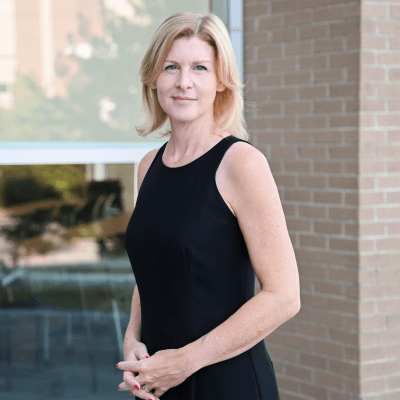
What is biomedicalization?
A term used by medical sociologists to capture the intensifying way that social experiences like pregnancy and childbirth are transformed into health problems that must be handled using medical solutions
September 15, 2023 | Erin Bluvas, bluvase@sc.edu
Emily Mann has been awarded more than $140K from the National Science Foundation’s Division of Social, Behavioral and Economic Sciences to study the biomedicalization of advanced maternal age. An associate professor in the Department of Health Promotion, Education, and Behavior and with McCausland College of Arts and Sciences’ Department of Women’s and Gender Studies, Mann uses her sociology and women’s and gender studies background to research reproductive health in the context of medicine, public health and social inequities. For this project, she will use her expertise to investigate how advanced maternal age may paradoxically lead to both increased risks and better outcomes for mothers and their infants.
“Medical experts regard pregnancies at older ages as high-risk for genetic anomalies, pregnancy complications and adverse pregnancy outcomes,” Mann says. “However, older first-time mothers are also more likely to be socially and economically advantaged, which can improve outcomes associated with high-risk pregnancies.”

A term used by medical sociologists to capture the intensifying way that social experiences like pregnancy and childbirth are transformed into health problems that must be handled using medical solutions
Since the 1970s, the average age of women giving birth for the first time has steadily increased. The number of women giving birth after age 35 – an age classified as “advanced maternal age” and “high risk” – has gone up by 900 percent over the past five decades. First birth rates for women ages 40 and older have doubled in the past 30 years. Though scientific studies have not shown a clear relationship between maternal age and certain adverse outcomes, many suggest that first-time pregnancies at age 35 and older pose higher risks for both mothers (e.g., hypertension, diabetes, mortality) and infants (e.g., chromosomal anomalies, stillbirths, neonatal deaths).
Despite the potential drawbacks of advanced maternal age, these same women have significant advantages compared to their younger counterparts. With numerous social determinants of health in their favor, many are members of racially privileged groups and are not vulnerable to the health inequities faced by minorities. They are also more likely to be highly educated and have had more time to establish stable parenting partnerships, build careers and improve their financial circumstances.
To better understand this complex interplay, Mann and her team will examine the production and dissemination of biomedical knowledge about advanced maternal age. She will conduct interviews and text analysis to understand how biomedical researchers, clinicians and women interpret and negotiate the risks associated with advanced maternal age.
“Given both the rising fertility rate among women of advanced maternal age in the
United States and the ongoing techno-scientific, cultural and political changes associated
with pregnancy and birth, this project has the capacity to generate important scientific
knowledge about the biomedicalization of advanced maternal age and its social significance,”
Mann says. “Findings from this study can be used to better inform women and their
health care providers with biomedical knowledge related to first-time births at age
35 or older.”

As a psychology (B.S. from Boston College) and women’s studies (M.A. from University College Dublin) student, Mann found her focus returning to reproductive rights. After completing her master’s degree, she spent a few years working at a Federally Qualified Health Center that primarily served Latino immigrants in the D.C. area.
“This experience led me to connect the dots between health care and reproductive health issues,” says Mann, who went on to complete a Ph.D. in Sociology at the University of Maryland – collaborating with the clinic on research during her doctoral program.
A postdoctoral research fellowship with Cynthia Gómez at San Francisco University’s
Health Equity Institute cemented Mann’s path. As the project manager for a large study
about Latino youth, Mann studied this population’s decision making about sex, pregnancy,
and parenthood in the context of the inequalities they face as members of a marginalized
groups. She has continued this line of research since joining the Arnold School in
2014 and broadened it to include advanced maternal age after a chance conversation
in 2018.
That conversation took place with sociology colleague Dana Berkowitz (Louisiana State University) about the experiences (e.g., receiving an interventionist approach to pregnancy/birth) of women in their peer group (i.e., racially privileged, highly educated, economically advantaged) who often delay childbearing. They decided to explore the topic further in the context of biomedicalization – a term used by medical sociologists to capture the intensifying way that social experiences like pregnancy and childbirth are transformed into health problems that must be handled using medical solutions.
With support from an ASPIRE I grant from USC’s Office of the Vice President for Research, they interviewed 55 women of advanced maternal age about their experiences. They found that although these women – whose advantages yielded them significant influence over many other aspects of their lives – expected to have more control over the birth process, most did not.
“Despite inconsistent scientific evidence, the perception that a pregnancy is inherently high-risk due to advanced maternal age is deeply entrenched in obstetric medicine,” they wrote in the Journal of Health and Social Behavior. “Obstetric health care providers attempt to mitigate the risk of adverse pregnancy outcomes perceived to be associated with advanced maternal age using … a constellation of interventions (that have) significant implications for the obstetric care experiences of pregnant women of advanced maternal age.”
Mann’s new project builds on this research by expanding the group of women interviewed while ensuring a racially diverse representation. By including the perspectives of clinicians, Mann will also increase our understanding of how the pros and cons of advanced maternal age are communicated and understood between patients and their health care providers.